Photos by Yotam Ronen, Anne Paq, Basel Yazouri, Oren Ziv, Faiz Abu Rmeleh, Ahmad al-Bazz, Keren Manor / Activestills.org
From asylum seeker struggles to the assault on Gaza, women were on the front lines of some of the major struggles in Israel/Palestine. In honor of International Women’s Day, Activestills brings you the best photos of the women who pushed for justice between the Jordan River and the Mediterranean Sea.
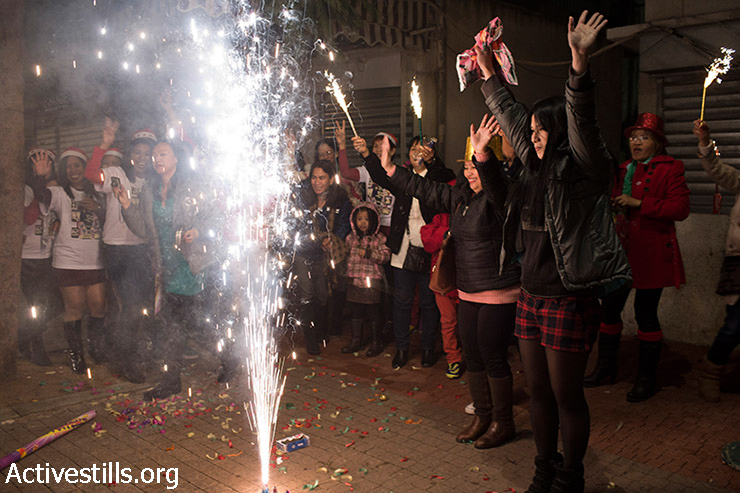
Filipino migrant workers celebrate New Year’s Eve in Tel Aviv’s southern Neve Sha’anan neighborhood, January 1, 2014.
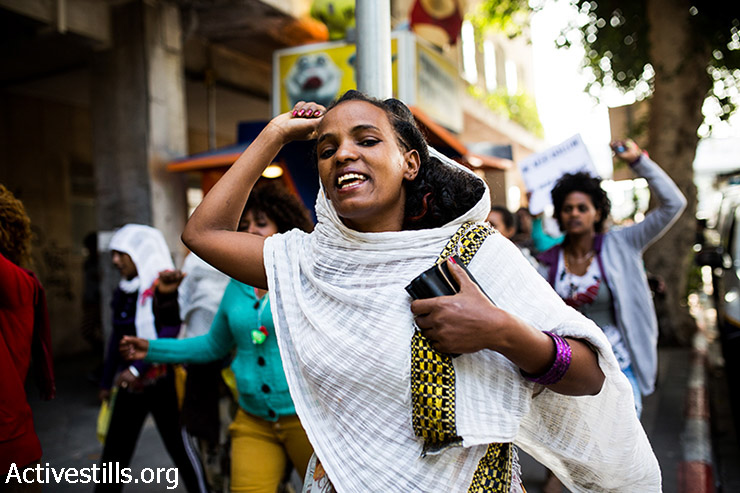
Women Asylum seekers and their children protest against the new Holot detention center and call on the Israeli government to recognize their rights as refugees, Tel Aviv, January 15, 2014.
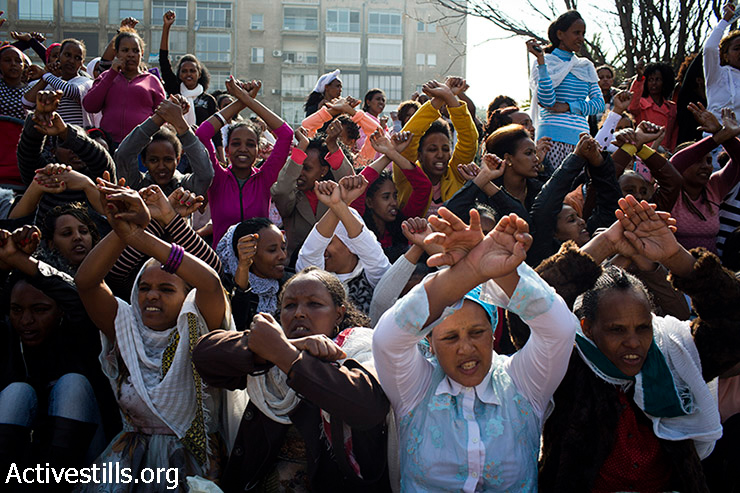
Women asylum seekers march from south Tel Aviv to the UNHCR offices and the U.S. embassy, to protest the establishment of Holot detention center. Tel Aviv, January 15, 2013.

Women run away from a stun grenade thrown at them by Israeli soldiers during the International Women’s Day march in Qalandiya, West Bank, March 8th, 2014. Some 400 women and supporters marched to the Israeli checkpoint holding signs and shouting slogans against the occupation and for boycotting Israel.
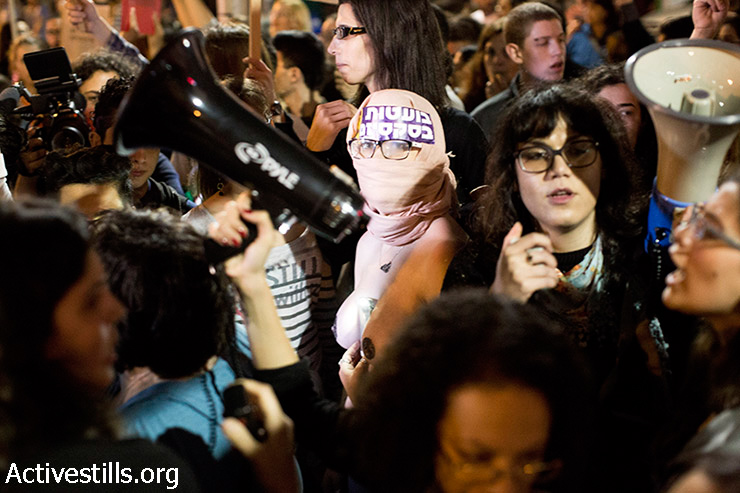
Israelis chant slogans during a demonstration against rape culture, in the wake of several high-profile cases of sexual harassment Tel Aviv, March 29, 2014.
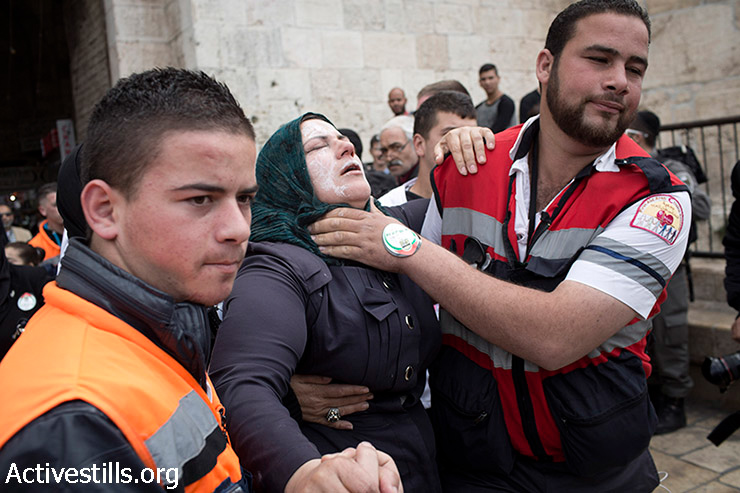
Palestinian medics evacuate a woman injured by pepper spray used by Israeli Border Policemen during a Land Day protest outside of the Old City of Jerusalem, March 30, 2014. Land Day marks the deaths of six Palestinian protesters at the hands of Israeli police during mass demonstrations on March 30, 1976, against plans to confiscate Arab land in the Galilee.
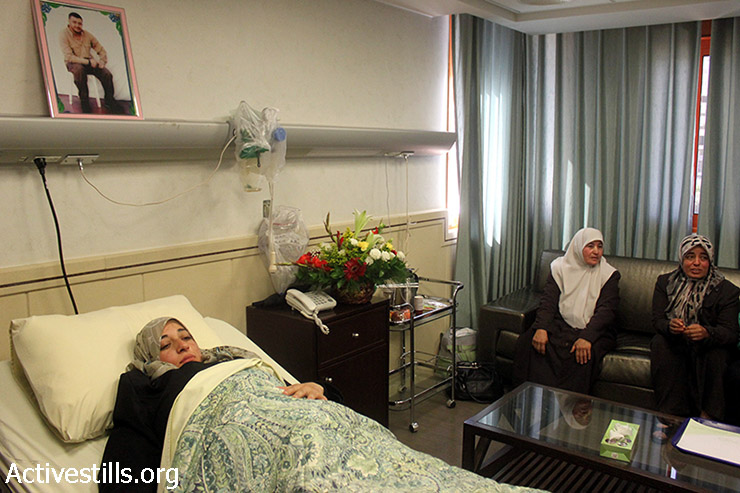
The wife of Palestinian prisoner Abdel-Fatah Shalabi, lies in a hospital bed a few hours before childbirth, Nablus, West Bank, April 2, 2014. The wife delivered a baby conceived through artificial insemination after her husband’s sperm was smuggled out of an Israeli prison. Shalabi was arrested in 2003 and was sentenced to 20 years in prison.
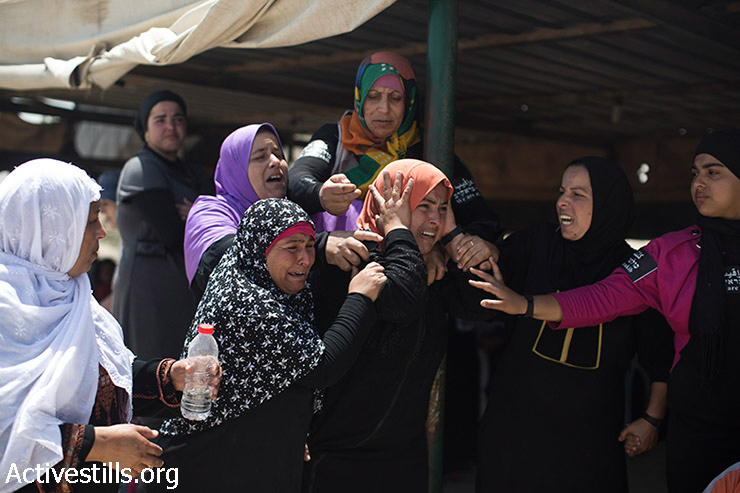
Bedouin women cry as they watch the Israeli authorities destroy their homes in the “unrecognized” Bedouin village Al Araqib, Negev Desert, June 12, 2014. Israeli authorities have demolished the village more than 80 times since 2010.
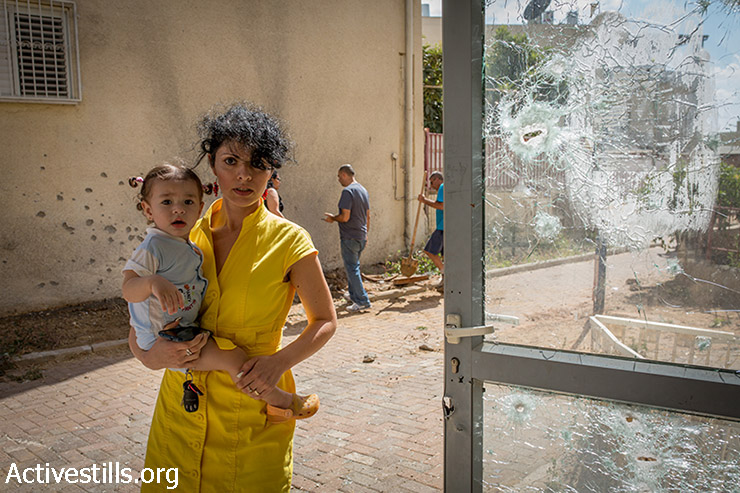
A woman holds her daughter near an area hit by a rocket launched from Gaza, Sderot, Israel, July 15, 2014.
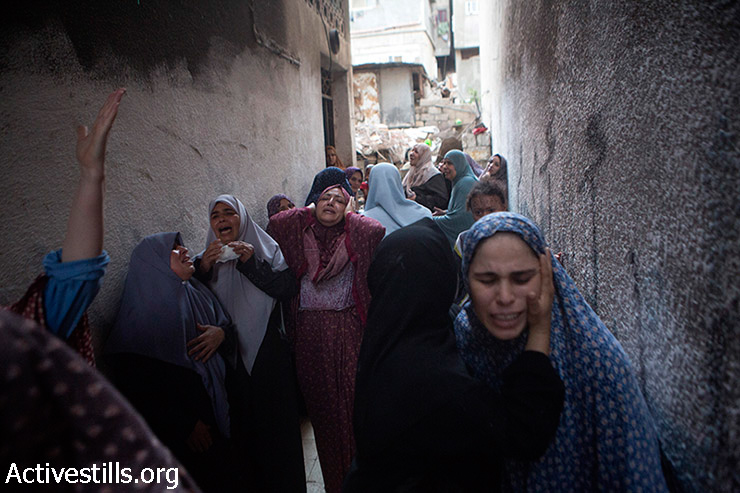
Palestinian women during the funeral of three children from the Shuhaibar family who were killed by an Israeli airstrike on the Sabra neighborhood of Gaza City, July 17, 2014. Two of the three boys were brothers: Jihad Issam Shuhaibar (8), and Wasim Issam Shuhaibar (7); their cousin Afnan Tariq Shuhaibar (10) was also killed. The airstrikes came immediately after a temporary five-hour humanitarian ceasefire between Hamas and Israel came to an end.
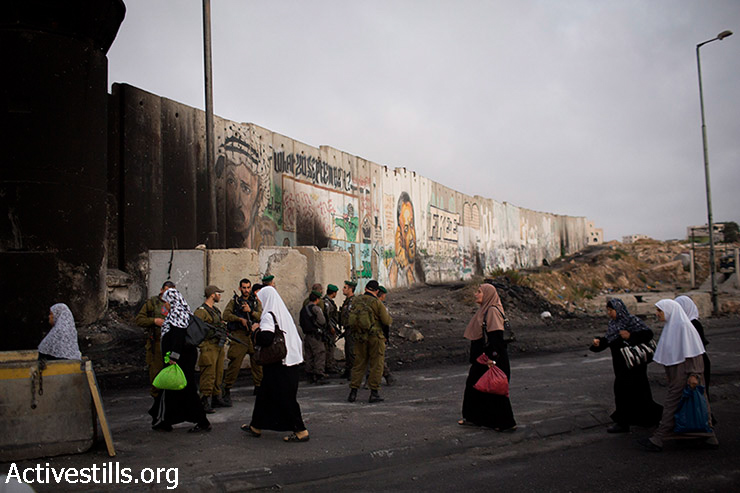
Palestinian women pass through Qalandiya checkpoint, near the West Bank city of Ramallah, on their way to attend the third Friday prayer of Ramadan in the Al-Aqsa Mosque, July 18, 2014. Muslim men under 50 and Muslim women under the age of 40 were forbidden from crossing the checkpoint.

Palestinian ctitzens of Israel hold bloodied dolls during a demonstration against the Israeli attack on Gaza, in the northern village Tamra, Israel, August 2, 2014.
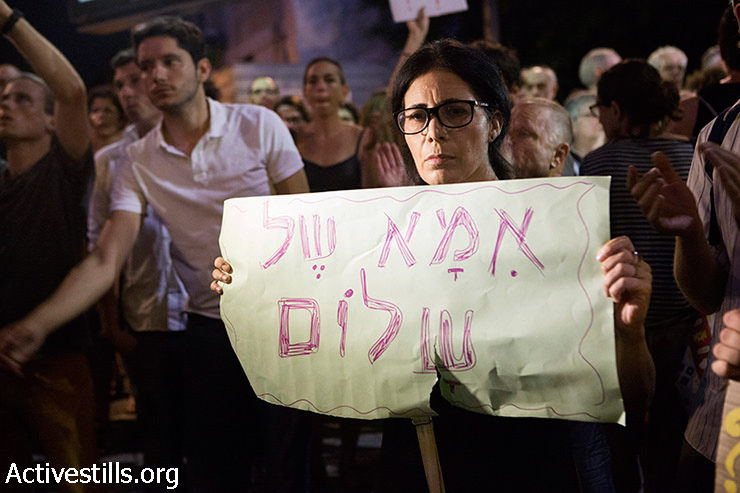
A mother of an Israeli soldier serving in Gaza holds a sign reading: “Mother of Peace,” during a demonstration in central Tel Aviv against the Israeli attack on Gaza, August 2, 2014. Police arrested 17 left-wing protesters as hundreds gathered outside Habima Theatre to call for an end to the assault.
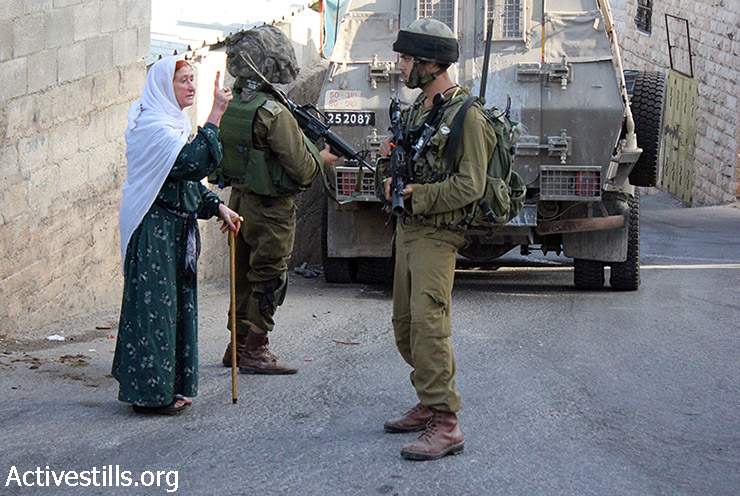
A Palestinian woman shouts at Israeli soldiers during an army operation that killed Zakaria al-Aqra, 24, in the West Bank village of Qabalan, Nablus, West Bank, August 11, 2014. Six other people from his family were wounded and parts of his house were destroyed during the operation, which lasted for eight hours.
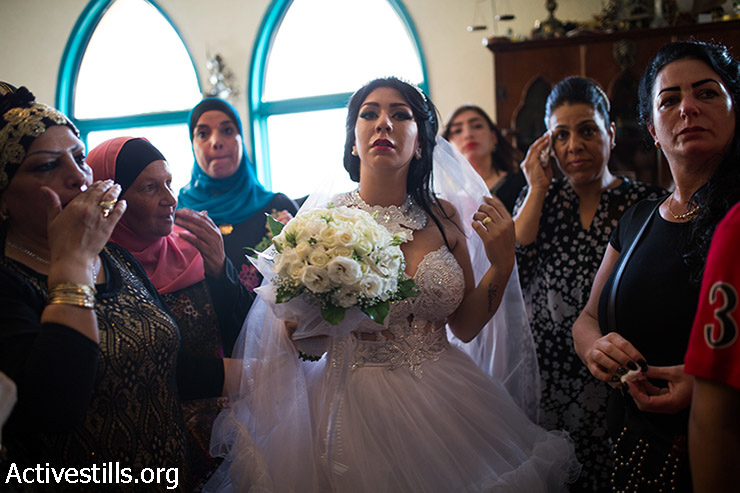
Moral Malcha, 23, seen as her husband, Mahmoud, arrives at his family’s house, Jaffa, Israel, 17 August 2014. Moral was born Jewish and converted to Islam in order to marry Mahmoud. Their wedding was protested by the ultra-nationalist organization Lehava.
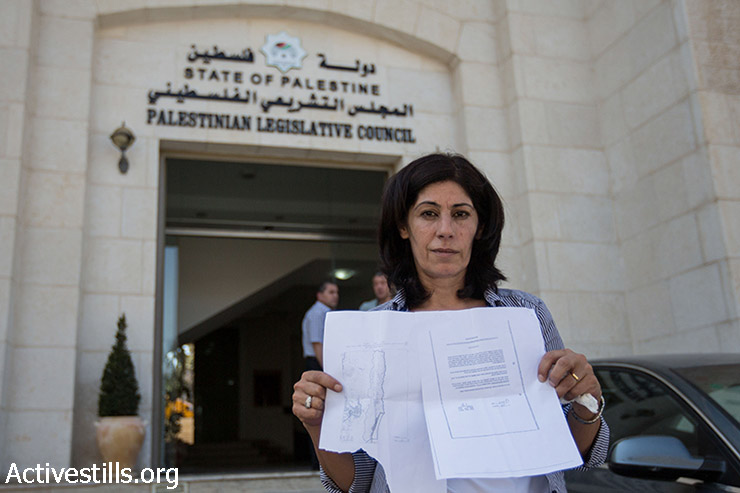
Khalida Jarrar, a member of the Palestinian Legislative Council and a leader in the Popular Front for the Liberation of Palestine, poses for a photo showing an internal expulsion order given to her by Israeli soldiers who invaded her home in Ramallah in the early hours of August 20, Ramallah. Jarrar was ordered to move to Jericho within 24 hours, but refused to sign the paper. She is determined to stay in a protest tent in front of the Palestinian Council in Ramallah until the decision is revoked.
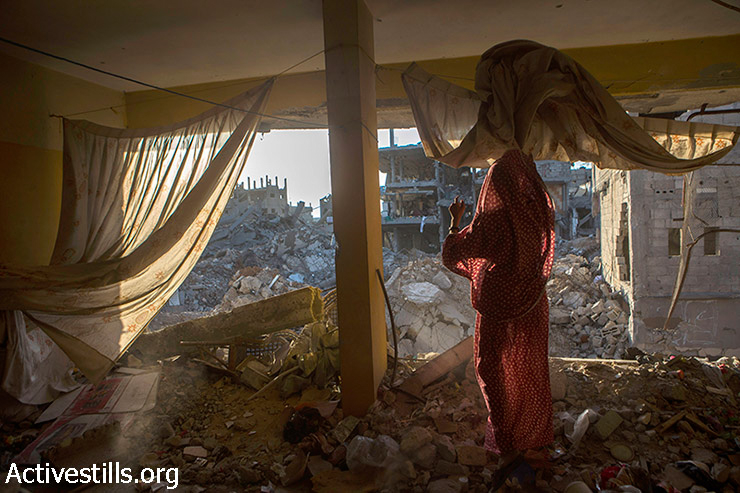
A Palestinian woman stands inside a damaged house in the Shuja’iyya neighborhood of Gaza City, which was heavily damaged during the latest Israeli offensive, September 4, 2014. During the seven-week Israeli military offensive, 2,101 Palestinians were killed, including 495 children, and an estimated 18,000 houses were either destroyed or severely damaged, leaving more than 108,000 people homeless.
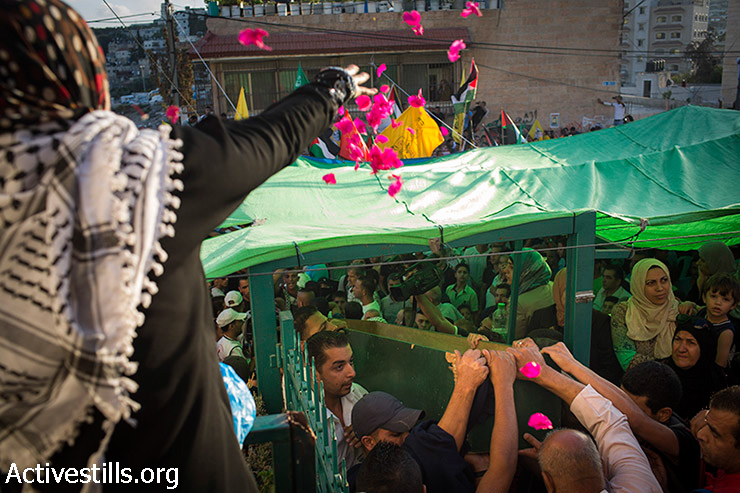
Palestinians carry the body of Mohammed Sinokrot during his funeral in the neighborhood of Wadi Joz, East Jerusalem September 8, 2014. Sinokrot, 16, was wounded by police gunfire in the neighborhood on August 31, and died from his injuries on September 7.

A Palestinian woman prepares bread in a traditional oven in the village of Khuza’a, eastern Gaza Strip, September 9, 2014. Khuza’a was heavily damaged during last Israeli offensive. Parts of the village were occupied by Israeli soldiers and were out of reach of ambulances or the media during the offensive.
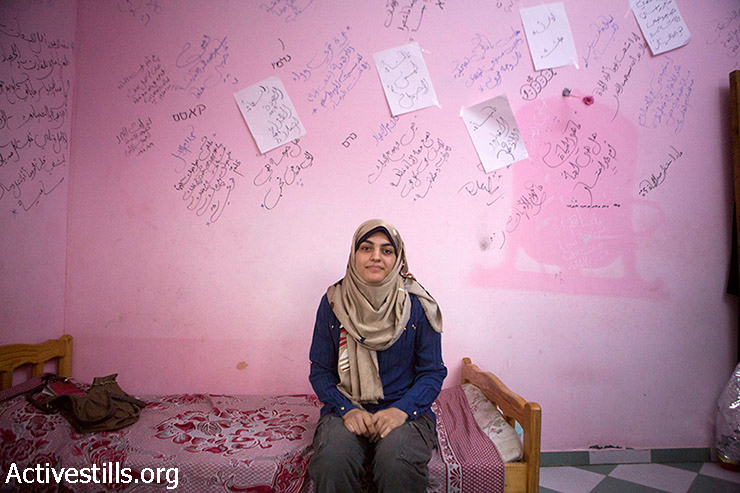
During the latest assault on Gaza, Doa Naim, 15, scribbled in Arabic and Hebrew on her bedroom wall. ‘By writing on the walls, I tried to say what I feel.’

Police raid evict the Halif family from their home in Tel Aviv’s Givat Amal neighborhood, September 17, 2014. Residents and community activists gathered in the neighborhood in an attempt to stop the eviction. The residents, who were placed there by the state in the 1950s, have been leading a struggle to recognize their rights to the property, which were sold to an Israeli businessman in the 1970s.
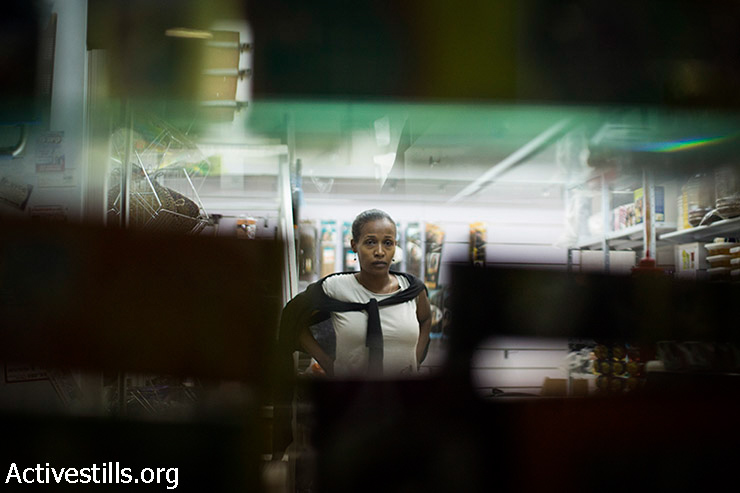
An African asylum seeker looks out from her shop, as residents of south Tel Aviv and right-wing nationalists protest against the High Court’s decision to strike down the Prevention of Infiltration Law and to close the Holot detention center, south Tel Aviv, October 5, 2014.
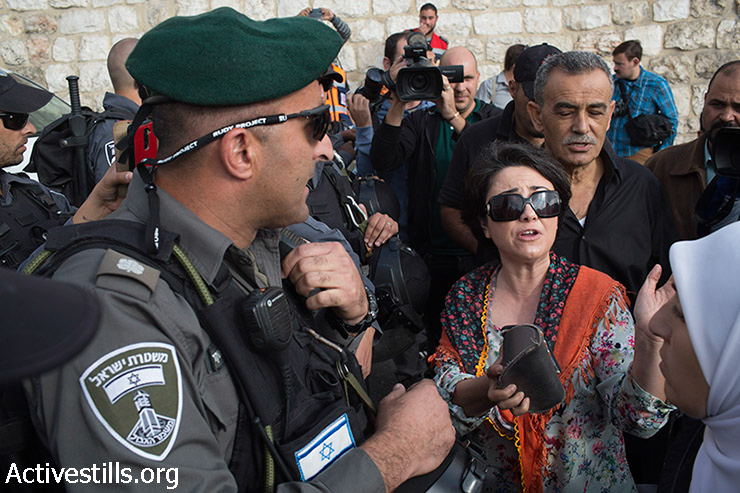
Palestinian MK Haneen Zoabi argues with Israeli policemen as she tries to enter Al-Aqsa Mosque during a protest in Jerusalem’s Old City against the decision to limit Muslims’ access to the compound, October 15, 2014. At least four protesters were arrested after Israeli police dispersed the demonstration.
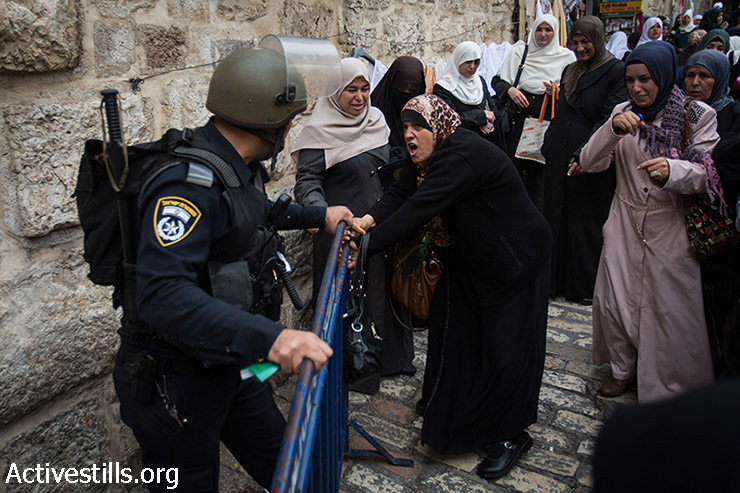
A Palestinian woman argues with an Israeli policemen near the Lion’s Gate in the Old City of Jerusalem November 2, 2014. Israeli police closed Al-Aqsa compound for a few hours to Muslims men under 45 and to women in all ages, after right-wing activists toured the compound that morning.
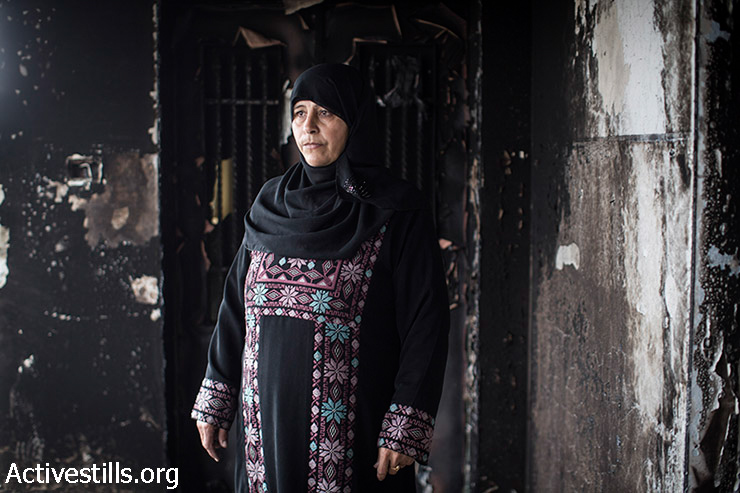
Huda Abu Ranni inspects the damage to her home, which was reportedly attacked and burned by Jewish extremists, in the village of Abu Falah, northeast of Ramallah, November 23, 2014.
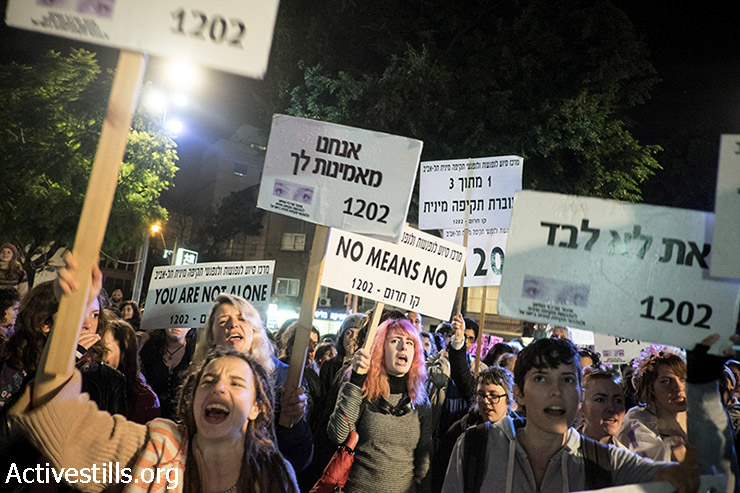
Activists march on the International Day for the Elimination of Violence Against Women, Tel Aviv, November 25, 2014.
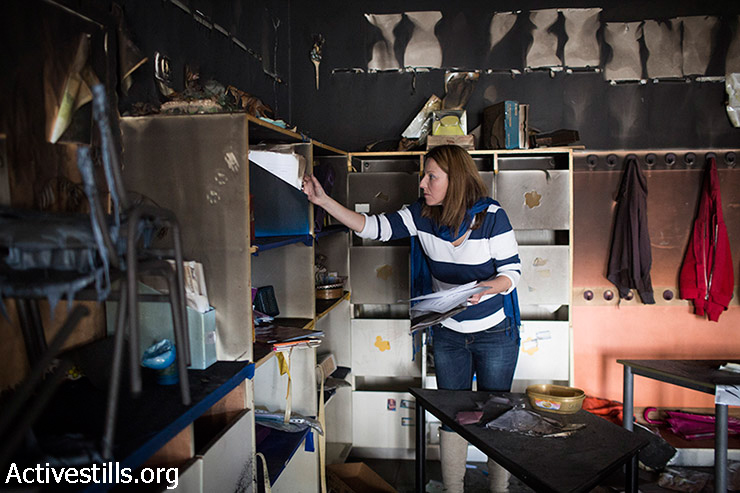
A teacher inspects the damage in the aftermath of an arson attack on first-grade classrooms in Jerusalem’s bilingual Jewish-Arab school, November 30, 2014. Anti-Arab slogans were scrawled on the walls, which read: ‘Death to Arabs,’ and ‘There is no coexistence with cancer.’
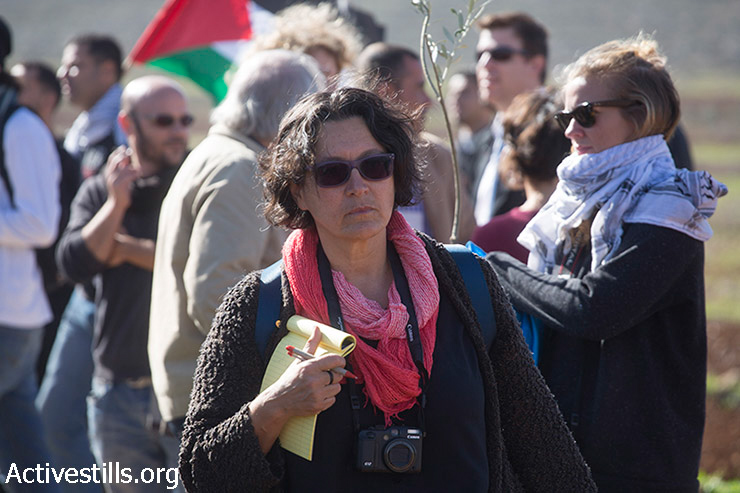
Reporter Amira Hass is seen during a protest marking International Human Rights Day in the village of Turmus Ayya near Ramallah, West Bank, December 10, 2014. Ziad Abu Ein, the Palestinian Authority Minister of Israeli Settlements and the Separation Wall, died following the protest, where he clashed with Israeli soldiers.
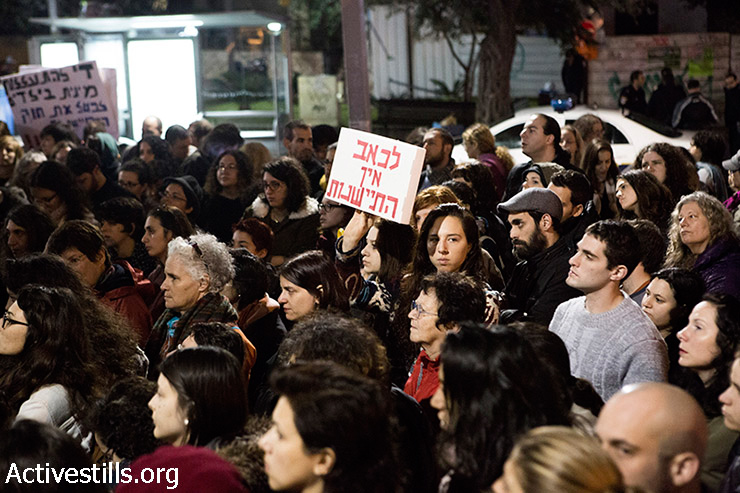
A woman holds a sign reading: ‘Suffering doesn’t have a statute of limitations’ during a memorial event for Maya-Gaya (Vered) Lev, Tel Aviv, Israel, December 21, 2014. Lev committed suicide on November 30, 2014 after failing to convince the Israeli legal system that she had suffered sexual abuse at the hands of her father and brother. Some 300 people gathered in memory of Maya-Gaya and called for the re-opening of her high-profile case, which was closed by the Israeli authorities.
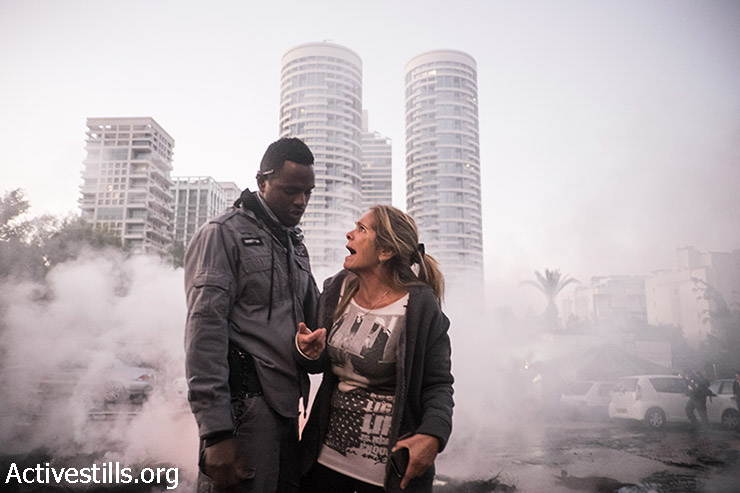
A woman confronts a policeman during the eviction of families in the Givat Amal neighborhood, Tel Aviv, December 29, 2014. After a lengthy legal battel, the Cozahinof family, with the assistance of Israeli police, evicted eight families from the working class neighborhood north of Givat Amal, without so much as proper compensation.
Subscribe to The Landline
+972's weekly newsletter































